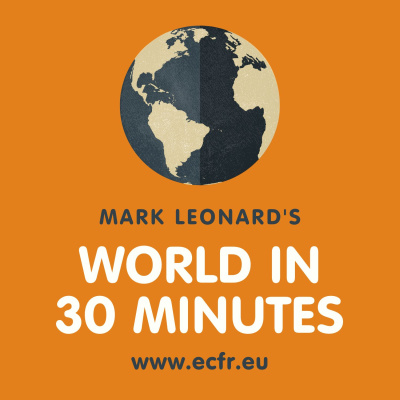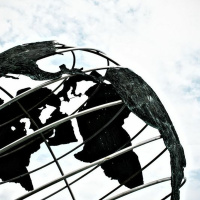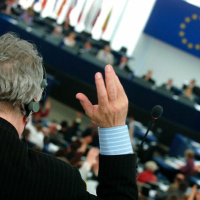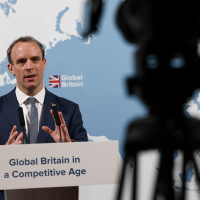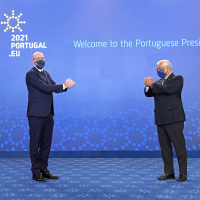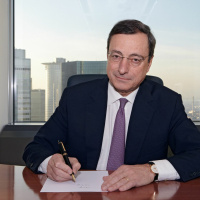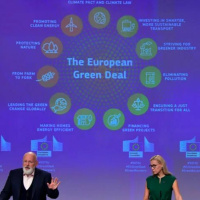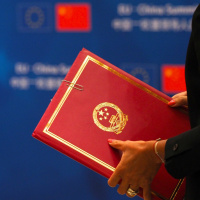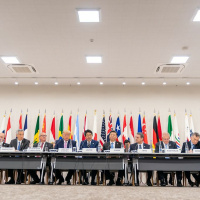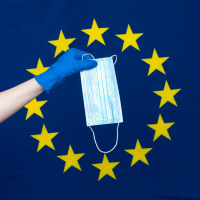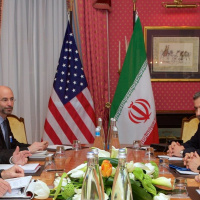Synopsis
Foreign policy podcasts hosted by Mark Leonard, Director of the European Council on Foreign Relations (ECFR), the first pan-European think-tank.
Episodes
-
Between war and order: What has shaped Europe’s geopolitics?
16/04/2021 Duration: 33minDiplomacy and war have both been part of human history, but neither are stagnant concepts. Different conceptions of the global order influence policy decisions daily, while the notions of war equally shape nation-states and our lives. To get a deeper understanding of how both ideas impact geopolitics, host Mark Leonard talks to Margaret MacMillan, professor of history at the University of Toronto and author of the book “War: How Conflict Shaped Us”, Robert Cooper, distinguished British and European diplomat and author of “The Ambassadors: Thinking about Diplomacy from Machiavelli to Modern Times” and Gideon Rachman, British journalist and chief foreign affairs columnist for the Financial Times. What are different models for thinking about global order? How do ideas about war shape what statesmen and -women do?This podcast was recorded on 14 April 2021.Bookshelf:• “The ambassadors: Thinking about diplomacy from Machiavelli to modern times ” by Robert Cooper• “War: How Conflict Shaped Us” by Margaret MacMillan•
-
Multilateralism after covid-19
09/04/2021 Duration: 30minNow that the world is entering a new phase of fighting the covid-19 pandemic, there is a renewed chance for working better together - and the European Union could do much to set these frameworks. But how can Europe adapt its strategies for multilateralism in this competitive world and what would they look like? Moreover, with other big players like China making their intentions to shape the global community unmistakably known, what reactions can Europe expect from a new-found agenda for multilateralism? This week’s host Susi Dennison tries to find answers to these questions with the help of Anthony Dworkin, ECFR research director and senior policy fellow, and Janka Oertel, ECFR’s Asia programme director and senior policy fellow. Together, they take a closer look at the potential for further global cooperation, the role Europe could play and future challenges the multilateral world will face.This podcast was recorded on 8 April 2021.Further reading:· “Built to order: How Europe can rebuild multilateralism afte
-
How the Turkey-UAE Rivalry is remaking the Middle East
02/04/2021 Duration: 26minDespite the asymmetry in their size, population, and military prowess, Turkey and the United Arab Emirates (UAE) have been engaged in a decade-long rivalry. This confrontation is not only feeding regional instability but is also deepening Europe’s divisions, making it more difficult for the European Union and its member states to develop a cohesive policy on the Mediterranean. This week, host Mark Leonard talks to Asli Aydıntaşbaş, ECFR´s Turkey expert, Cinzia Bianco, visiting fellow working on the Arabian Peninsula and Gulf region, as well as Julien Barnes-Dacey, director of the Middle East and North Africa programme at ECFR. Together, they examine the origins of the rivalry, its impacts on the EU, as well as the arenas the rivalry outplays. Finally, they try to answer a most critical question: How can the EU prevent the Turkey-UAE rivalry from destabilising European security and foreign policy?This podcast was recorded on 31 March 2021. Further reading: • “Useful enemies: How the Turkey-UAE rivalry is remak
-
One crisis, many responses: Fighting the first wave of the pandemic
26/03/2021 Duration: 30minJust over a year ago, a health crisis of proportions never seen in recent history captured the attention of the world. However, faced with the same threat, nations all over the globe reacted vastly differently to the covid-19 pandemic. To find out why, host Mark Leonard talks this week to Peter Baldwin, professor of history at the University of California and author of the new book “Fighting the first wave: Why the coronavirus was tackled so differently across the globe”. Together, they discuss why the approaches to handling the coronavirus differed so much even in countries normally considered rather similar, like the Nordics. Who succeeded initially and who did not and for what reasons? Looking back, what can we learn from the fight against the first wave of corona and what will the lasting impact be? This podcast was recorded on 15 March 2021. Further reading: - “Fighting the first wave: Why the coronavirus was tackled so differently across the globe” by Peter Baldwin: https://buff.ly/3rmsS66- “Leadership
-
In search of Global Britain
19/03/2021 Duration: 31minThe British government has outlined an overhaul of the UK's foreign and defence policies. The Integrated Review of the UK’s Defence, Security, Development and Foreign Policy, published this week, lays out a vision for the country’s role in the world over the next decade. Host Mark Leonard talks to Jo Johnson, a former Member of the British Parliament between 2010 and 2019 who held key ministerial offices in each of the last three Conservative governments, attending Cabinet as Minister of State for Universities, Science, Research and Innovation. Together, they discuss the proposed Indo-Pacific tilt and the UK means by sovereignty in the context of the review. But most importantly, how does continental Europe fit into all of this? This podcast was recorded on 18 March 2021.Further reading:• Global Britain in a Competitive Age: the Integrated Review of Security, Defence, Development and Foreign Policy https://www.gov.uk/government/publications/global-britain-in-a-competitive-age-the-integrated-review-of-security
-
Dual circulation: China’s new economic strategy
12/03/2021 Duration: 34minIn May 2020, China announced its new economic strategy which aims at cutting the country’s dependence on overseas markets and technology in the long-term. This “dual circulation strategy” was yet another result of the deepening rift with the United States. But what does this new economic policy mean for Europe? Host Mark Leonard is joined by Janka Oertel, director of the Asia programme at ECFR as well as Andrew Small, senior transatlantic fellow with the Asia programme at the German Marshall Fund of the United States as well as associate senior policy fellow at ECFR. What lies behind China’s dual circulation strategy? How will the EU approach all of this? And are European policy-makers really prepared to deal with this new challenge coming from China?This podcast was recorded on 4 March 2021.Bookshelf:· “The rise of industrial policy in China, 1978-2012” by Sebastian Heilmann and Lea Shih · Interview with Joe Kaeser in Handelsblatt [German] · “Decoupling - severed ties and patchwork globalisation” by the Euro
-
Belarus’s brutal politics
05/03/2021 Duration: 30minIn 2020 Belarus made headlines when protests erupted in the aftermath of a fraught presidential election. Alexander Lukashenko, who has ruled Belarus for over 26 years, still clings to power today and has unleashed a crackdown on the protests and protesters with a level of brutality unseen in Europe for decades. Vessela Tcherneva, ECFR deputy director takes over the podcast this week to examine the subject of Belarus further. How did we actually get here? And what kind of implications do the developments in Belarus have for the wider neighbourhood and Europe? Andrew Wilson, ECFR senior policy fellow, Nicu Popescu, director of the ECFR Wider Europe Programme as well as Pavel Slunkin, ECFR visiting fellow from Belarus, discuss these questions.Further reading: https://ecfr.eu/topic/belarus/ This podcast was recorded on 3 March 2021.Bookshelf:•“Belarus – the last European dictatorship?” by Andrew Wilson • “American Oligarchs: The Kushners, the Trumps, and the marriage of money and power” by Andrea Bernstein •“Atl
-
A fair, green and digital recovery - brought to you by Portugal
26/02/2021 Duration: 30minOn January 1, Portugal took over from Germany at the helm of the Council of the EU’s rotating presidency and the government set out three priorities for this presidency captured in its slogan “Time to deliver: a fair, green and digital recovery”. What is needed for a fair and inclusive climate and digital transition? What will the biggest short-term challenges be? And how can the Portuguese presidency strengthen European strategic autonomy? Mark Leonard is joined by Claudia Azevedo, CEO, Sonae, Teresa Gouveia, ECFR Board Member and former Portuguese Minister of Environment and of Foreign Affairs, and finally, Carlos Moedas, former European Commissioner for Research, Science and Innovation, to discuss the prospects of the ongoing Portuguese Council presidency.This podcast was recorded on 24 February 2021. Further reading:"Crisis presidency: How Portuguese leadership can guide the EU into the post-covid era" by Susi Dennison & Lívia Franco: https://buff.ly/3mxp7cl - “Where Portugal can lead Europe in 2021”
-
Super Mario to the rescue
19/02/2021 Duration: 25minThis week, former European Central Bank Chief Mario Draghi was sworn in as the country’s prime minister and the head of a unity government and put an end to weeks of political turmoil. His cabinet is the third administration that Italy sees in less than three years. But how stable will this government be? What are the first challenges Draghi will face in his country and in Brussels? Will he be able to stand on equal footing with Macron and Merkel? Host Mark Leonard talks to Lia Quartapelle, Italian parliamentarian of Partito Democratico, Alessandro Speciale, Bloomberg Italia director, and head of ECFR’s Rome office Arturo Varvelli about what the Draghi government will mean for Italy and Europe.This podcast was recorded on 17 February 2021. Bookshelf:•“Pale Rider: The Spanish Flu of 1918 and How It Changed the World” by Laura Spinney •“The Ladies of Grace Adieu and Other Stories” by Susanna Clarke •“Passé, présent et futur de Mario Draghi : la carrière politique d’un technician” by Alessandro Aresu & Andr
-
Stranger in Moscow: Borrell’s unwelcome visit
12/02/2021 Duration: 31minThis month, High Representative Josep Borrell visited Moscow to discuss key issues of concern and test the waters for building a more “constructive dialogue” between Russia and the European Union. His visit came at a time of elevated tensions, as calls for sanctions against the Russian Federation are increasing and both sides debate over the recent poisoning and imprisonment of Alexei Navalny, as well as issues concerning the Nord Stream 2 pipeline. What lessons can be drawn from Borrell’s controversial visit? Why do attempts to reset relations with Russia fail? In this week’s episode, Mark Leonard is joined by Kadri Liik, senior policy fellow at ECFR and Russian domestic and foreign policy expert, Nicu Popescu, Director of ECFR´s Wider Europe programme, and José Ignacio Torreblanca, head of ECFR's Madrid office to discuss Europe’s strategy vis-à-vis Russia. This podcast was recorded on 10 February 2021.Further reading:- “Why attempts to reset relations with Russia fail” by Nicu Popescu: https://buff.ly/3rnwG
-
The global impact of the European Green Deal
05/02/2021 Duration: 29minWhat are the key aspects of how the European Green Deal will change the world? Introduced by the new European Commission in 2019, the Green Deal’s goal is to decouple economic growth from resource use and to create an EU economy with zero net emissions of greenhouse gases by 2050. To reach that goal a fundamental overhaul of the European economy is needed. But this transformation will also have a dramatic effect on external economic relations and on foreign policy. This week host Mark Leonard invited ECFR Council Member and Member of the German Bundestag for Alliance 90/The Greens Franziska Brantner as well as Jean Pisani Ferry and Simone Tagliapietra from the Brussels-based think-tank Bruegel to discuss the geopolitical repercussions of the European Green Deal.This podcast was recorded on 4 February 2021.Further reading:“The geopolitics of the European Green Deal” by Mark Leonard, Jean Pisani-Ferry, Jeremy Shapiro, Simone Tagliapietra, and Guntram Wolff: https://buff.ly/3cJHAjWBookshelf: • “National power an
-
The future of EU-China-US relations
29/01/2021 Duration: 32minOne of the foreign policy priorities of US president Joe Biden is to work with allies on China. His administration reached out to the European Union ahead of his inauguration to make US intentions clear. However, so far, they have only been met with disappointment over the alacrity with which European leaders pushed forward the agenda of the comprehensive agreement on investment before Biden was even sworn in as president. What are the prospects for transatlantic cooperation on China now that a new US administration is in power? Has it ended before it has begun, or will we see a new Western approach to dealing with China’s rising power? This week, our host Mark Leonard is joined by Janka Oertel, head of ECFR’s Asia programme and Andrew Small, senior transatlantic fellow with the Asia programme at the German Marshall Fund of the United States and associate senior policy fellow at ECFR, to discuss the future of EU-China-US relations.This podcast was recorded on 28 January 2021.Further reading:- “Europe’s China
-
How Europeans see Biden’s America
22/01/2021 Duration: 25minThe new poll by ECFR revealed that despite the joy and relief many Europeans felt when Joe Biden won the US presidential election, they do not think he can help America make a comeback as the pre-eminent global leader. This week, Susi Dennison is taking over the podcast, joined by our usual host, Mark Leonard as well as Jeremy Shapiro, ECFR’s research director and in-house US expert. How do Europeans assess the future of transatlantic relations? Can the EU finally come to terms with its strategic sovereignty goal? And what does this mean for policy-makers in European capitals and across the Atlantic in Washington D.C.?This podcast was recorded on 21 January 2021.Further reading: "The crisis of American power: How Europeans see Biden’s America" by Ivan Krastev and Mark Leonard: https://buff.ly/3oXcLvsBookshelf:• “The upswing: How America came together a century ago and how we can do it again” by Robert D. Putnam & Shaylyn Romney • “The comedians” by Graham Greene • “Reset: Reclaiming the internet for ci
-
Top ten foreign policy trends in 2021
15/01/2021 Duration: 18minIt’s time for our annual review!It has become tradition that at the beginning of each year, World in 30 Minutes host Mark Leonard and Jeremy Shapiro, Research Director at ECFR, predict ten bright and bold policy projections for the year to come. Predictions for 2020 took a real beating from the coronavirus pandemic, but thanks to some very generous rounding, the end of year score came to 6 points out of 10. What are your foreign policy predictions for 2021? Let us know by tweeting at us @ecfr or comment here below or on Facebook.This podcast was recorded on 13 January 2021.Further reading: The long year: Top foreign policy trends for 2021: https://buff.ly/3636nLQTop ten foreign policy trends in 2020: https://buff.ly/2XE1G6qCheck out all predictions since 2016: https://buff.ly/3oJbwA8Bookshelf:- “The Mermaid from Jeju” by Sumi Hahn- “Cyber War & Cyber Peace in the Middle East" edited by Michael Sexton and Eliza Campbell Hosted on Acast. See acast.com/privacy for more information.
-
The coronavirus world order
08/01/2021 Duration: 29minIn the early days of covid-19, it became clear that none of the great powers were looking to the multilateral system to provide an answer. As the death count rose, every country acted as if it was on its own, closing borders, stockpiling medical equipment, and introducing export controls. The blame game conducted by Beijing and Washington over the WHO showed how geopolitics is increasingly undermining multilateralism. While it seems increasingly evident that the global challenges of today require global solutions, how can we explain the current crisis of the liberal international order? In this week’s podcast, Mark Leonard is joined by John Ikenberry, Albert G. Milbank Professor of International Affairs at Princeton University, to discuss the roles of the US and the EU in supporting liberal internationalism to address the problems of modernity and build a world safe for democracy.This podcast was recorded on 9 December 2020.Further reading:“The Next Liberal Order” by John Ikenberry: https://buff.ly/3j50qTC “
-
The geopolitics of a covid-19 vaccine
01/01/2021 Duration: 27minAs Europe is in the middle of the second wave of the covid-19 pandemic, everyone hopes that a vaccine will put an end to it and thereby stop raising the death tolls and repeating lockdowns. In this week’s episode, Anthony Dworkin takes over the podcast to talk to Gunilla Carlsson, ECFR Council member and Vice-Chair of the Global Fund Strategy Committee, and Ilona Kickbusch, founding director and chair of the Global Health Centre at the Graduate Institute of International and Development Studies in Geneva about the global distribution of covid-19 vaccines and the geopolitics surrounding this. What are upcoming challenges for the COVAX initiative? How should we expect European countries to balance their commitment to protect their own populations vs global responsibilities?This podcast was recorded on 17 December 2020.Bookshelf:• "Risk society" by Ulrich Beck • Swedish poetry• "Why the Germans do it better" by John Kampfner Hosted on Acast. See acast.com/privacy for more information.
-
Europe’s battle of narratives
18/12/2020 Duration: 30minThe corona outbreak has put the world’s leaders and the way they communicate to their people, to the test. Each country wants to project a positive self-image, portraying itself as a strong and capable crisis manager. In these past months, there have been attempts to discredit other countries, their political systems, and their responses to the pandemic. Also, scientific facts have been under scrutiny and challenged by “alternative facts” and disinformation. This week’s host, Susi Dennison, director of ECFR’s European Power programme is joined by ECFR Council Members Christine Ockrent and Julia De Clerck-Sachsse to talk about what HR/VP Josep Borrell called a “global battle of narratives and a struggle for geopolitical influence.”This podcast was recorded on 10 December 2020.Further reading:“La guerre des récits. Xi, Trump, Poutine: la pandémie et le choc des empires” by Christine Ockrent“From Brussels with love: How the European Union can win the battle of narratives” by Julia De Clerck-Sachsse: https://buff
-
All eyes on Ethiopia: What the EU and the US can do
11/12/2020 Duration: 29minust over a month ago, Abiy Ahmed, Prime Minister of Ethiopia and 2019 Nobel Peace Prize winner, ordered a military offensive against regional forces in Tigray. Since then, the situation has been spiralling out of control, with increasing international concern over access to the Tigray region and reports of attacks against UN personnel trying to gain access. ECFR’s Susi Dennison takes over in this week’s episode to discuss the regional implications of the conflict and the prospects for transatlantic cooperation around the issue. She is joined by Theo Murphy, Director of ECFR’s Africa programme, Payton Knopf, Senior Advisor to the Africa programme of the US Institute for Peace, and Alexander Rondos, ECFR Council Member and EU Special Representative to the Horn of Africa.This podcast was recorded on 9 December 2020. Further reading:- “Final Report and Recommendations of the Senior Study Group on Peace and Security in the Red Sea Arena”, U.S. Institute of Peace: https://buff.ly/2JS25PqBookshelf: - “Afropean: Not
-
How the US could return to the Iran nuclear deal
04/12/2020 Duration: 29minThe election of Joe Biden presents an opening to strengthen transatlantic diplomacy on Iran. Biden has already outlined his intention to prevent a nuclear-armed Iran, primarily by ensuring the US re-joining the Joint Comprehensive Plan of Action (JCPOA), from which the US unilaterally withdrew under outgoing President Trump. However, to what extent can and will Iran policy be a priority of the incoming administration? What can Europeans do to bolster transatlantic diplomacy on Iran? This week Mark Leonard is joined by Nasser Hadian, professor of political science at the University of Tehran, Ilan Goldenberg, director of the Middle East Security Program at the Center for a New American Security and ECFR’s Ellie Geranmayeh, deputy head of our Middle East and North Africa programme to discuss these issues. This podcast was recorded on 2 December 2020.Further Reading:“A call for Europe to bolster transatlantic diplomacy on Iran”, a joint statement by ECFR Council Members: https://buff.ly/3qfKrFCOn Iran, the Next
-
Can the Frugals transform the EU?
27/11/2020 Duration: 27minThe geopolitical grouping known as the “frugal four” — Austria, Denmark, Sweden and the Netherlands — has emerged as a key power centre in this year’s negotiations over the EU’s next budget and the covid-19 recovery fund. However, flying the “frugal” banner now seems like it could become a trap — both for the countries themselves and for the rest of the EU. In this week’s episode, host Mark Leonard is joined by Catharina Sørensen, deputy director of the Danish “Think Tank Europa”, Caroline de Gruyter, ECFR Council Member and Europe correspondent and columnist for the Dutch newspaper NRC Handelsblad, Daniel Sachs, ECFR Council member and CEO of the board of Sweden-based Proventus AB, and ECFR policy fellow Pawel Zerka. Does “frugality” actually reflect the public sentiment in those countries? How do the citizens really feel about the recovery fund? And how could the leaders of the frugal states reposition their countries as transformative engines for the EU?Further reading: The transformative five: A new role
